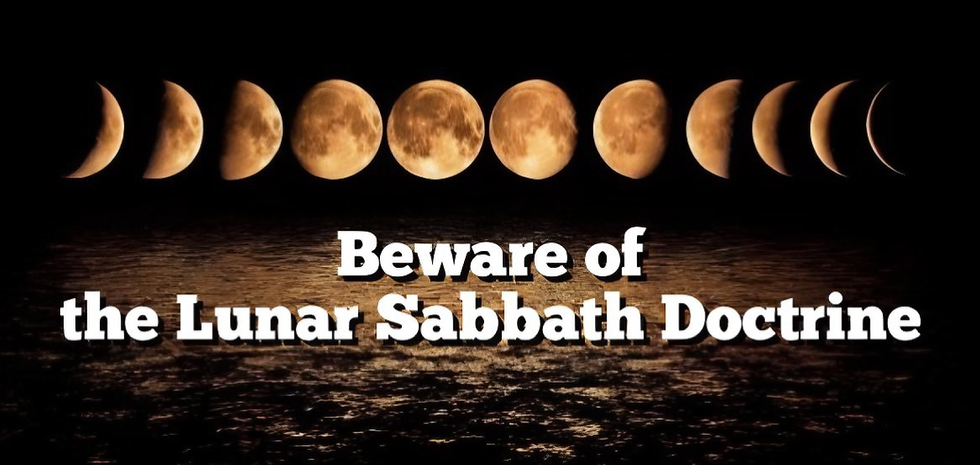Debunking the Lunar Sabbath Theory: A Return to the Authority of Torah
- carl1jimenez
- Apr 21
- 6 min read

A new wind of doctrine has swept across the Hebrew Roots and Messianic communities, one that claims the seventh-day Sabbath does not follow a continuous weekly cycle, but is instead calculated anew each month from the new moon. This teaching, known as the Lunar Sabbath theory, asserts that Sabbaths always fall on the 8th, 15th, 22nd, and 29th days of each lunar month. While it may sound plausible to those unfamiliar with the full counsel of Yahweh's Word, this theory is not only unscriptural but rooted in Babylonian cosmology, Talmudic mysticism, and a rejection of Torah-based chronology.
This article will dismantle the Lunar Sabbath doctrine using Torah, internal biblical chronology, historical documentation, and agricultural logic. We will also examine the origin of this doctrine, its dangerous spiritual implications, and its potential ties to pagan and Gnostic systems.
The Torah Reveals a Continuous Seven-Day Week
From the very beginning, Yahweh established a continuous weekly cycle independent of moon phases.
“And Elohim blessed the seventh day, and sanctified it: because that in it He had rested from all His work which Elohim created and made.”(Genesis 2:3)
This foundational passage never mentions lunar observation or any reset of the week. The seventh-day Sabbath was sanctified before there was sin, before there was Yisrael, and before there was a Levitical priesthood. It is a creation ordinance, not a lunar festival.
When Yahweh later gave Yisrael manna in the wilderness, He confirmed the continuity of the weekly cycle with a miracle that lasted for 40 years:
“Six days you shall gather it, but on the seventh day, which is the Sabbath, there shall be none.”(Exodus 16:26)
There is no command to “watch for the new moon” to determine when the Sabbath would occur. In fact, the very idea of skipping days (such as New Moon day resets) would have broken the cycle and caused confusion about which day to expect the double portion of manna.
The Lunar Sabbath Violates the Fourth Commandment
“Six days shalt thou labor, and do all thy work: But the seventh day is the Sabbath of Yahweh thy Elohim…”(Exodus 20:9–10)
This command presupposes a fixed ratio: six days of labor followed by one Sabbath day. The Lunar Sabbath system inserts extra days, New Moon days that do not belong to the weekly count, breaking the work/rest pattern established by Yahweh.
If one adopts the Lunar system, a person could end up working eight or nine consecutive days without a Sabbath, or resting on days Yahweh never sanctified. This is a clear violation of the Torah’s instruction.
No Scriptural Witness for Sabbaths on the 8th, 15th, 22nd, and 29th
Lunar Sabbath proponents often claim that biblical events falling on the 15th (like the Exodus) are proof that Sabbaths were lunar. But correlation does not equal causation. While some Sabbaths might fall on these dates occasionally, there is no command, no example, and no testimony in Scripture stating that Sabbaths must always occur on those days of the month.
In fact, consider this: If the Sabbath always fell on the 15th, then Yahweh would have had to move the appointed feasts so they would never fall on the same day. But Leviticus 23 shows overlap between weekly Sabbaths and annual Sabbaths, proving that the weekly Sabbath is independent of the monthly cycle.
For example, the Day of Atonement is commanded to fall on the 10th day of the 7th month:
“It shall be unto you a Sabbath of rest... in the ninth day of the month at even, from even unto even, shall ye celebrate your Sabbath.”(Leviticus 23:32)
This proves the weekly Sabbath can fall on a date other than the 8th, 15th, 22nd, or 29th, destroying the entire foundation of Lunar Sabbathism.
This is not the weekly seventh-day Sabbath, it is a moed (appointed time) and is treated as a Sabbath due to its sanctity. The text clearly commands that it begin on the evening of the 9th and continue into the 10th of the seventh month.
Why It Destroys the Lunar Sabbath Theory
Although it’s a High Sabbath, the key point remains:
The 10th day of the month is being called a Sabbath.
This proves that Sabbaths, whether weekly or annual, do not always fall on the 8th, 15th, 22nd, or 29th of the month, as Lunar Sabbatarians teach.
If the Lunar Sabbath system were correct, Yahweh would have ensured that all Sabbaths align with their model, and He clearly did not.
In fact, multiple annual Sabbaths fall on other days:
Feast of Trumpets – 1st day of the 7th month (Leviticus 23:24–25)
Yom Kippur – 10th day of the 7th month (Leviticus 23:27–32)
First Day of Unleavened Bread – 15th of 1st month (aligned with their model)
Last Day of Unleavened Bread – 21st day (Leviticus 23:6–8)
These High Sabbaths can fall on any day of the week. That alone breaks the uniform cycle proposed by the Lunar Sabbath doctrine. So even though Leviticus 23:32 refers to a High Sabbath, not a weekly one, it still refutes the Lunar claim that Sabbaths only fall on lunar-based dates.
If every new moon is truly a Sabbath, a day on which no labor is permitted, then why does Yahweh explicitly command Zerubbabel to gather wood and begin the work of rebuilding the Temple on the very first day of the month? (Haggai 1:1, 2, 8, 12). This alone exposes the contradiction at the heart of the lunar sabbath doctrine.
The Origin of the Lunar Sabbath Doctrine
The Lunar Sabbath theory has no known documentation among the early Hebrews. It does not appear in the Dead Sea Scrolls, the Septuagint, or even among the Karaite or Rabbinic traditions. Its roots can be traced to:
Talmudic speculation and mysticism, particularly within Hillel II’s post-Temple calendar reforms.
Babylonian astrology, where lunar phases were used to schedule religious festivals.
Modern reinterpretations introduced in the 20th century by various sects like the World Mission Society Church of God, certain splinter groups of Sacred Name movements, and lunisolar calendar enthusiasts.
The Encyclopedia Biblica quotations often cited by Lunar Sabbath teachers speak of a “development” away from the lunar connection, but these quotes are being taken out of context. What they describe is the post-biblical, rabbinic evolution of the calendar, not Yahweh’s original design. Furthermore, the Encyclopedia Biblica itself is not a Torah-based source, but a critical liberal Christian text from the 19th century written by scholars who rejected inspiration.
Agricultural Cycles Demand a Continuous Week
The Torah was given to a people living in an agricultural society. Planting, reaping, sowing, and resting the land all followed seasonal rhythms. A Sabbath that “floats” based on the moon would wreak havoc on farming life.
In fact, Yahweh’s command in Leviticus 25 for a Sabbath year every seven years assumes a fixed seven-year cycle, just like the week. If the weeks were lunar-based, then calculating seven years of consistent 7-day weeks would be impossible, making the command to rest the land in the seventh year unworkable.
The Danger of Rejecting the Plain Word of Yahweh
At the heart of the Lunar Sabbath doctrine is a subtle attack on the authority of Torah. Rather than trusting what is plainly written, proponents rely on speculative interpretations, extra-biblical books, and calendrical systems not given by Yahweh.
Yahweh warned us not to add to or take away from His commandments:
“You shall not add unto the word which I command you, neither shall ye diminish ought from it, that ye may keep the commandments of Yahweh your Elohim…”(Deuteronomy 4:2)
The Lunar Sabbath doctrine adds a lunar reset never commanded and diminishes the simplicity of the 7-day week He established at creation.
Return to the Ancient Paths
The weekly Sabbath is not lunar. It is not Babylonian. It is not Talmudic. It is not Rabbinic. It is not Roman. It is Yahweh’s gift from the beginning of time, a sanctified appointment that exists outside of man’s calendars, traditions, and theories.
The prophet Jeremiah spoke of this path:
“Thus saith Yahweh, Stand ye in the ways, and see, and ask for the old paths, where is the good way, and walk therein, and ye shall find rest for your souls…”(Jeremiah 6:16)
Let us reject these lunar innovations and return to the original, unbroken rhythm established in Eden, a rhythm confirmed in the wilderness, inscribed in stone at Sinai, and upheld by Yahshua the Messiah Himself.
By: Carlos Jimenez



Comments